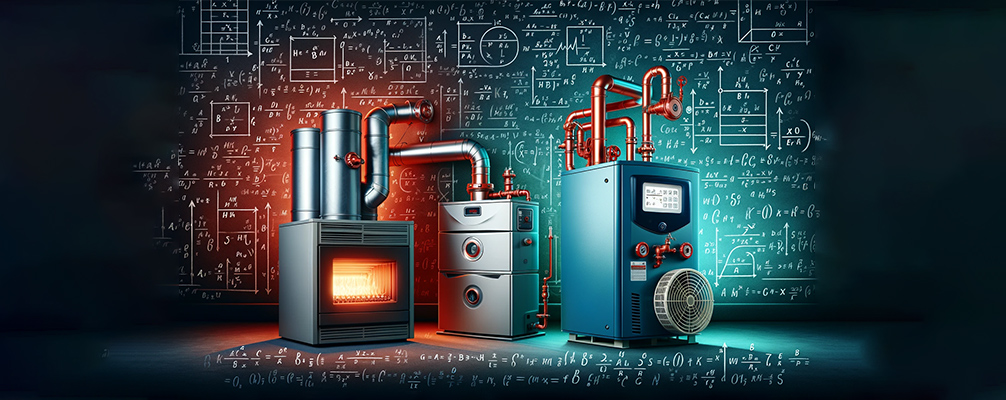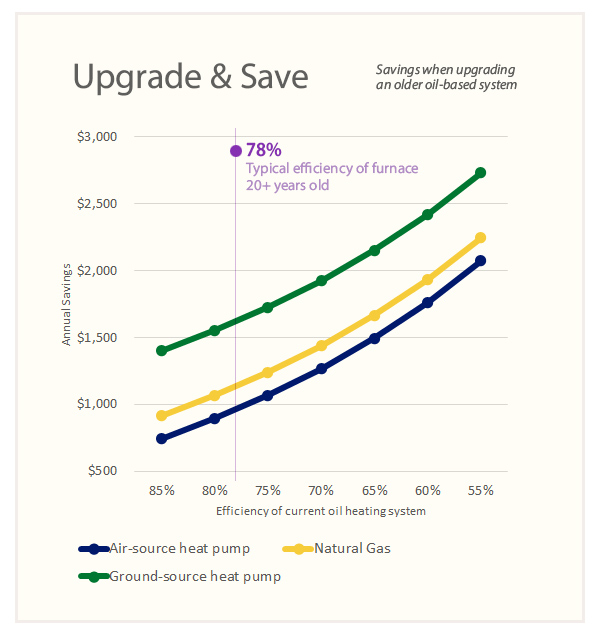The Importance of Efficiency

Do you know how efficient your home’s heating system is?
While most of us have a pretty good idea how many miles to the gallon (or kWh) our cars get, we’re less likely to know how efficiently our home heating systems are performing.
But that number can have a big impact on the bottom line for your home budget.
A wide variation
The old boiler in the basement that was there when you moved in might have an efficiency of as low as 56% while today’s geothermal systems can push 600%.
Why such a big difference?
It depends on the type, age, and initial efficiency of your heating system. Older furnaces and boilers were manufactured at a lower efficiency than today’s models and also tend to lose efficiency over time.
In addition, systems that run on oil, propane, or natural gas have maximum efficiencies of about 90-98%, while heat pumps (air-source or ground-source) can exceed 100% because they use electricity to move heat, not generate it directly. (By the way, space heaters and electric resistance heaters generate heat directly from electricity, and both are about 100% efficient.)
Translating efficiency to cost
Does a heating system operating at 56% efficiency cost nearly twice as much to operate as one operating at nearly 100% efficiency?
That depends. If it’s the same fuel type, yes. If not, no.
Each type of fuel has a different cost and energy density. For example, let’s take a nice round number of 1 million BTUs and see the cost for each fuel.
| Fuel Type | Quantity in 1 million BTUs | Cost per unit | Cost per 1 million BTU |
|---|---|---|---|
| Oil | 7 gallons | $4.93 | $34.51 |
| Propane | 11 gallons | $3.76 | $41.36 |
| Electricity | 293 kWh | $0.26 | $77.67 |
| Natural Gas | 10 ccf | $2.41 | $41.36 |
*Source: NYSERDA & Central Hudson, average prices during 2022-23 heating season
The table above doesn’t factor in efficiency. Let’s run the numbers using some typical efficiency amounts for the latest heating equipment, including some different types of electric heat.
| Fuel Type | Efficiency | Cost per 1 million BTU |
|---|---|---|
| Oil boiler/furnace | 87% | $39.67 |
| Propane boiler/furnace | 95% | $41.36 |
| Electric resistance | 100% | $77.67 |
| Air-source heat pump | 275% | $28.24 |
| Ground-source heat pump | 450% | $17.26 |
| Natural gas boiler/furnace | 95% | $25.37 |
As you can see, more efficiency doesn’t necessarily mean lower cost, except when comparing the same fuel type. For example, with the various types of electric heat.
If you’re changing heating systems
Chances are if your heating system is working at the efficiencies listed in the above table, it was probably installed quite recently and you’re not in the market for a new one. But if you’re system is more than 15 years old, and may need to be replaced soon, you’ll see a larger difference if you upgrade. (If you want to check the efficiency of your current system, there should be a label on the units that provides the AFUE [Annual Fuel Utilization Efficiency] as a percentage.)
For example, let’s look at going from an existing oil-based system with various real-world efficiencies to a high-efficiency natural gas system, or ground- or air-source heat pump, and what the savings would be for a heating load of 60 million BTU over the course of the winter, a typical heating load for a home in the Northeast.

In this example, the annual savings when switching from an oil furnace with an efficiency of 78% would be as follows:
- Ground-source heat pump: $1,619.02
- Natural gas: $1,132.51
- Air-source heat pump: $960
(78% is a typical efficiency amount for an older furnace.)
Conclusion
Efficiency is an important factor to take into consideration when deciding how to upgrade your heating system. If you have an older heating system, there's a good chance a new, more efficient system could pay for itself with energy-savings. Visit our heating system fuel-switching calculator and our pages detailing incentives we offer for natural gas and heat pump upgrades.


